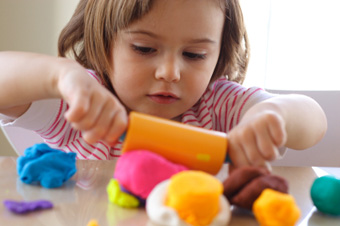Toddlers' Language Development from 30-36 Months

By the age of 30 to 36 months, your toddler's language skills have grown by leaps and bounds.
Your child probably peppers you with questions and loves to talk to others.
Here's what else to expect at this age.
Language Milestones
Between 30 and 36 months, a typical toddler:
- Tells stories, sings nursery rhymes, and does finger plays.
- Repeats five word sentences.
- Talks to himself or herself about recent events and make believe characters.
- Uses social words: "please," "thank you," "hello."
- Names most body parts.
Play and Activity
Continue to take the time to talk to your toddler and ask about the things that interest him or her - this is an invaluable way to encourage language development.
Here are some other tips for supporting your child’s language skills:
- Sing number songs and rhymes like Five Little Monkeys.
- Ask open ended questions: "What did you see on your walk?"
- Be prepared to answer lots of questions.
- Instead of always answering your toddler’s questions, occasionally ask: "What do you think?"
- Make up silly rhymes.
- Invent songs.
- Read to your toddler often.
Other Language Milestones
Between 30 and 36 months your toddler may also:
- Use and understand direction and position words, such as "around," "backwards," "forward," "inside," and "underneath."
- Comment on pictures in books.
- Show an understanding of story plots and act them out using puppets or dolls.
- Answer complex questions, such as "What is this?" or "How did you do that?"
- Respond to requests: "Go find your coat, please," or "Please get a paper towel."
Resources & Links
HealthLink BC: Speech and Language Milestones, Ages 1 to 3 Years
-
Bathtub Finger Paints Activity for an individual child Age group: 18-40 months Duration of activity: 15 minutes Materials: 2 tablespoons liquid soap 1 tablespoon cornstarch Food coloring Most toddlers love to get messy. What better place for a messy
-
A wide range of issues can disrupt your toddlers speech development. Physical impairments can prevent your child from correctly forming words. Alternatively, processing problems may keep your childs internal communication system from carrying a m
-
First, the good news: Since the dawn of time, toddlers have been throwing temper tantrums out of frustration and in order to get the things that they desire. Most temper tantrums are not violent affairs but do involve lots of tears and yelling. Re


